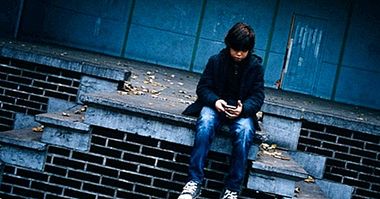When returning home after living in another country is a problem
Going to live in another country is not only a cultural shock at the time of arriving at the new house and adapting to the local customs of the foreign land. Many times, It also means a second shock, though, that comes with some time lag . Specifically, when we return to our country of origin and we realize that everything has changed.
This is a phenomenon known as inverse cultural shock and which is one of the consequences of uprooting and the anxiety that emigration brings with it. And it is a sensation as vivid and intense as it is difficult to describe.
Readapting to what we thought we knew
When someone migrates to a distant place, not only must they invest time and effort in adapting to the new landscape and the customs that prevail in it; He is also performing another kind of sacrifice, although this second one is not so noticeable. Specific, you are missing everything that happens in the place where you put down your roots and that is linked to their memories, their learned customs and, therefore, their identity and self-concept.
This discreet facet of uprooting has another drawback. Unlike what happens when we struggle to adapt to the foreign country we have gone to live in, the impact of arriving home after several years and realizing that we are no longer so linked to it is something we do not expect, that surprises us and that, for that reason, it produces an extra dose of stress .
The reverse cultural shock appears precisely in that brush with sparks between the country of origin that we are visiting and what we expected to find when we arrived at it.
Strangers in our own home
Time passes for the whole world, also for those who are going to live outside. That is why it is a hard blow to return home and realize not only that we have missed a lot of relevant events, but also do not even know how to "move" very well for this place.
What friendships do we have left? Where have gone part of the businesses and shops that we used to go? How has the people we loved changed so much? All these questions, added to the fact that over time the people of our social circle have been unaccustomed to spend time with us, They can cause us to experience three sensations: isolation, confusion and doubts about one's identity.
The reverse cultural shock
The opposite cultural shock is, precisely, what one experiences when one feels that one does not fit in with the way of doing and acting with the culture to which one considered oneself belonged by the fact of having lived in it for many years in last.
On the one hand, life in the country of origin has not remained static, but has been evolving both materially and culturally. On the other the way of acting and thinking of the country to which we emigrate will have left a mark on our brain, although we did not notice it , and for that reason it is very probable that when returning to house we see everything with other eyes.
The fact of returning home and not feeling entirely one place or the other makes us feel uprooted and that we need to readjust to life in the country that saw us grow.
Frustration with the new customs
Go home and be frustrated by not finding large open areas on Sundays, despair with the way of speaking of our compatriots, not find ingredients that we learned to love beyond the borders of our own country ... The sum of these small daily events can do that we feel frustrated and stressed, and even that we can not make our plans and schedules work well for a while.
Returning to the home in the best possible way implies being clear that we must devote a minimum of effort in adapting ourselves to this place that is so familiar to us. After all, both what we have learned during our years living outside and what we forgot about our own land , going through what we thought would remain the same in our own neighborhood, can make us feel very lost, alone and confused if we do not remedy.
Relearning to live in our country
What to do in these cases? The main thing is to break with the possible isolation that can take over our lives if we assume that we can return to our country of origin and act as we did before. We may have to expand our circle of friends and put more of our part to stay with the friends we keep.
In the same way, it is preferable not to pretend that the past years have not existed: to embrace what the distant lands have taught us is a good idea, since that kind of memories have become part of their own identity and try to suppress them would be an imposture , in addition to being a blow to one's own self-esteem.If we have to hide those signs that we have lived abroad, does it mean that the mark that the other country has left us are undesirable and that we are worth less for having let it enter our way of thinking? Of course not.



















